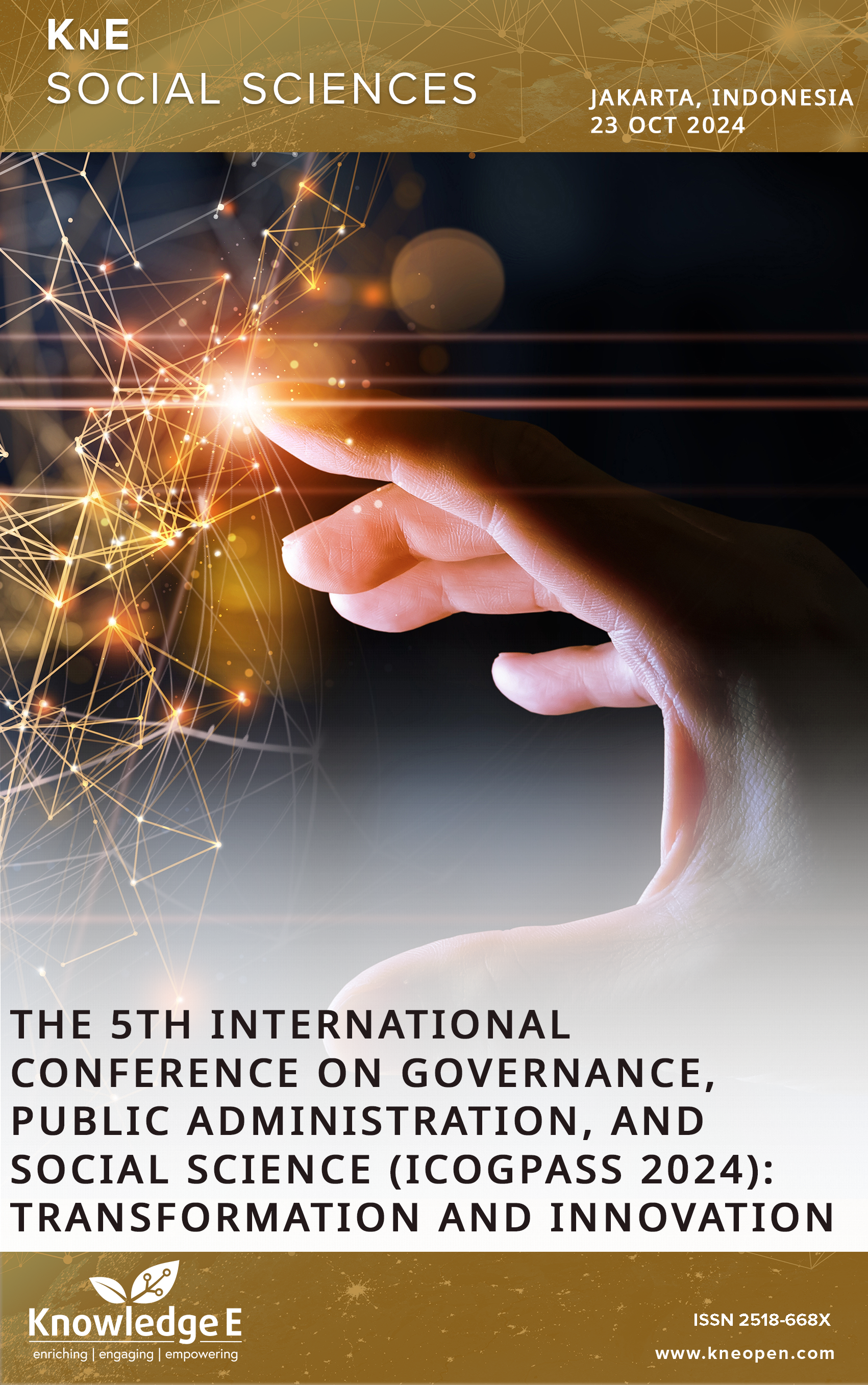Digital Government Reform: Analysis and Trends Through Systematic Literature from 2004-2024
DOI:
https://doi.org/10.18502/kss.v10i16.19177Keywords:
digital government, reform, bibliometric analysisAbstract
Turbulent globalization has driven transformation across multiple sectors, including shifts in government systems toward digital governance. This research aims to explore how government systems are transitioning to digital platforms in various countries, with a particular focus on the Asian region for a more in-depth and holistic review. The study employs a systematic literature review of digital government reforms in Asian countries over the past twenty years (2004–2024), using the Scopus database with the keywords “Digital,” “Government,” and “Reform.” It also employs bibliometric analysis using VOSviewer software. The findings reveal that several Asian countries, including Vietnam, China, Japan, South Korea, Singapore, Indonesia, and Malaysia, have initiated the implementation of digital government systems with varying degrees of success. These countries have leveraged technologies such as the Internet of Things (IoT), big data, and artificial intelligent (AI) to foster innovation and improve governmental performance. However, significant challenges remain, including regional digital disparities and the need for more adaptive and responsive policies to keep pace with technological change. The study concludes that although notable progress has been made, further research is needed to identify the key factors influencing the successful implementation of digital government systems in Asia.
References
[1] Rusfiana Y, Supriatna C. Memahami Birokrasi Pemerintahan Dan Perkembangan. Alf Bandung; 2021.
[2] Nababan S. Strategi Pelayanan Informasi untuk meningkatkan Keterbukaan Informasi Publik. J Ilmu Komun. 2020;17(2):166.
[3] Katsonis M, Botros A. Digital Government: A Primer and Professional Perspectives. Aust J Public Adm. 2015;74(1):42–52.
[4] O’Reilly T. O’Reilly: What Is Web 2.0. Des patterns Bus Model next Gener Softw. 2005;30.
[5] Gasparyan A. From paperwork to pixels : workload and digital governance in Armenian local authorities. 2024;(March). https://doi.org/10.3389/fpos.2024.1280109.
[6] Nurdin AH. Menuju Pemerintahan Terbuka (Open Government) Melalui Penerapan E Government [Manajemen Pemerintahan]. J MP. 2018;5( January).
[7] OECD. Recommendation of the Council on Digital Government Strategies. Public Gov Territ Dev Dir. 2014;July.
[8] Aminah S, Saksono H. Digital transformation of the government: A case study in Indonesia. J Komun Malaysian J Commun. 2021;37(2):272–88.
[9] Koo E. Digital Transformation of Government: From E-Government to Intelligent EGovernment. 2019;1–92.
[10] Basyo I, Anirwan A. Pelayanan Publik Era Digital: studi Literatur. Indones J Intellect Publ. 2023;4(1).
[11] Cahyarini FD. Implementasi Digital Leadership dalam Pengembangan Kompetensi Digital pada Pelayanan Publik. J Stud Komun dan Media. 2021;25(1).
[12] Yusri AZ dan D. Reformasi Administrasi Publik [Internet]. Vol. 7, Jurnal Ilmu Pendidikan. 2020. 809–820 p. Available from: http://repository.lppm.unila.ac.id/24376/1/REFORMASIADMINISTRASIPUBLIK.pdf
[13] Ozturan M, Ugurkan Surucu. Citizen Satisfaction with E-Government Services: Case of Turkey. Int J Res Sci Innov |. 2019;VI(Xii).
[14] Tskhadadze K. E-Government Implementation on the Example of Georgia. TalTech J Eur Stud. 2024;14(1):253–70.
[15] Osman IH, Anouze AL, Irani Z, Al-Ayoubi B, Lee H, Balc A, et al. COBRA framework to evaluate e-government services: A citizen-centric perspective. Gov Inf Q. 2014;31(2):243–56.
[16] Cao QT, Vuong QH, Pham HH, Luong DH, Ho MT, Hoang AD, et al. A bibliometric review of research on international students’ mental health: science mapping of the literature from 1957 to 2020. Eur J Investig Health Psychol Educ. 2021 Jul;11(3):781– 94.
[17] Clarke A. Digital government units: what are they, and what do they mean for digital era public management renewal? Int Public Manage J. 2020;23(3):358–79.
[18] Men F, Dong F, Liu Y, Yang H. Research on the Impact of Digital Transformation on the Product R&D Performance of Automobile Enterprises from the Perspective of the Innovation Ecosystem. Sustainability (Basel). 2023;15(7):6265.
[19] Hien DT, Van Hoc D, Phuong NT. Building And Perfecting Digital Government in Ho Chi Minh City, Vietnam: The Necessity and Motivation in Today’s Businesses. Int J Relig. 2024;5(5):409–15.
[20] Wang S, Sun X, Zhong S. Exploring the Multiple Paths to Improve the Construction Level of Digital Government: Qualitative Comparative Analysis Based on the WSR Framework. Sustainability (Basel). 2023;15(13):9891.
[21] Gasco-Hernandez M, Nasi G, Cucciniello M, Hiedemann AM. The role of organizational capacity to foster digital transformation in local governments: The case of three European smart cities. Urban Gov. 2022;2(2).
[22] Alzahrani AI. A periodical analysis of e-government maturity in Saudi Arabia. Transform Gov People, Process Policy. 2022;16(1). https://doi.org/10.1108/TG-05-2021- 0083.
[23] Abu Ghazaleh M, Zamberi Ahmad S. Ajman Digital Government: the way forward to digest digitalization. Emerald Emerg Mark Case Stud. 2018;8(2).
[24] Al-Mamary YH, Alshallaqi M. Making Digital Government More Inclusive: An Integrated Perspective. Soc Sci (Basel). 2023;12(10):557.
[25] Brummer M, Ueno H. Crisis and choice in digital transformation: COVID-19 and the punctuated politics of government DX in Japan. Asia Pac J Public Adm. 2024;46(4):360–91.
[26] Chung CS, Choi H, Cho Y. Analysis of Digital Governance Transition in South Korea: Focusing on the Leadership of the President for Government Innovation. J Open Innov. 2022;8(1):2.
[27] Tan SY, Taeihagh A. Smart city governance in developing countries: A systematic literature review. Sustainability (Basel). 2020;12(3):899.
[28] Kim PS. A behavioral approach to administrative reform: a case study of promoting proactive administration in South Korea. Public Adm Policy. 2022;25(3):310–22.
[29] Angelidou M. Smart cities: A conjuncture of four forces. Cities. 2015;47:47.
[30] Macke J, Casagrande RM, Sarate JA, Silva KA. Smart city and quality of life: Citizens’ perception in a Brazilian case study. J Clean Prod. 2018;182:182.
[31] Abu Bakar H, Razali R, Jambari DI. A Qualitative Study of Legacy Systems Modernisation for Citizen-Centric Digital Government. Sustainability (Basel). 2022;14(17):10951.
[32] Karnadi L, Kurniawan Y. Unlocking Rural Economy Growth through Digital Economy: Study Of Online Payment Acceptance Among Rural Retailers In Kelantan. J Entrep Bus. 2021;9(1):58–71.
[33] Sunil P. Key highlights of the new Malaysia Digital Economy Blueprint, a part of the MyDIGITAL initiative. Hum Resour Online. 2021;(February).
Published
How to Cite
Issue
Section
License
Copyright (c) 2025 Asri Nur Salmah, Kristina Setyowati, Rino Ardhian Nugroho

This work is licensed under a Creative Commons Attribution 4.0 International License.

